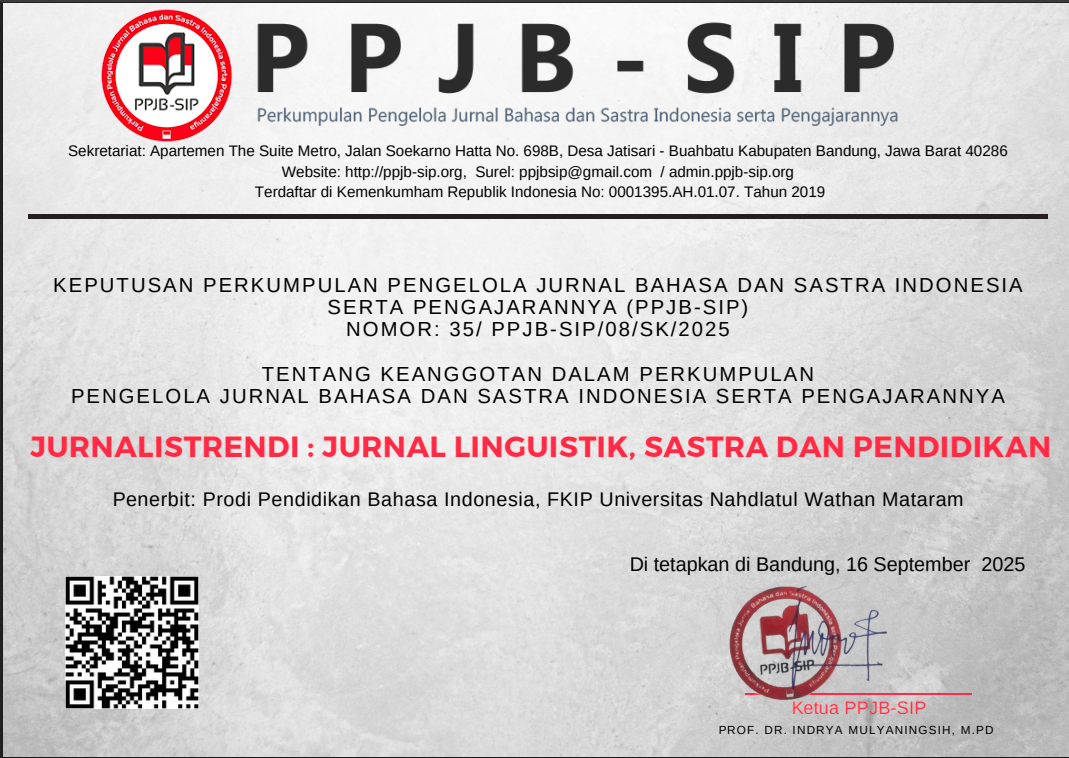Idealisme Berbahasa pada Media Sosial sebagai Upaya Meminimalisasi Konflik di Masyarakat
Abstract
This research aims to explore three things related to the use of language in social media, namely: (a) the use of social media language that has the potential to cause conflict in society (b) identify the motives for using social media language (c) outline the basic concepts of idealism in social media language in society . This research is descriptive in nature because it describes or describes the phenomenon under study. The data is in the form of narrative conversation communication through social media. This research is included in the descriptive group because it aims to describe data in as much detail as possible from natural settings. The focus of his research is the use of language on social media that is prone to causing conflict. The results of this study indicate that language in social media does not require speakers and their partners to meet at the same time and place, often does not pay attention to language ethics, so it is vulnerable to triggering conflict in society. The motives for using language on social media are also very diverse, namely satire, expressions of complaint or disappointment, social protest, and jokes. Minimizing conflicts triggered by language expressions on social media can be done with several strategies (1) paying attention to interests, desires, behaviors, or goods, (2) exaggerating feelings of interest, approval, and sympathy, (3) increasing interest, (4) showing identity/group similarities, (5) seek agreement, (6) avoid conflict, (7) presuppose the perception of a number of speaker similarities, (8) make jokes, (9) presuppose that speakers understand the wishes of the interlocutor, (10) make offers and promises, (11) showing a sense of optimism, (12) trying to involve the speech partner in a particular activity, (13) giving and asking for reasons, (14) offering a reciprocal action, and (15) giving sympathy to the speech partner.
Downloads
References
_______. (2017). Hoax dan Runtuhnya Etika Komunikasi Oleh. Lombok Post, p. 17.
Budiyono. (2015). Fenomena Komunikasi Politik dalam Media Sosial. IPTEK-KOM, Vol. 17 No. 2, Desember 2015: 143-160
Dharmawan, Arya Hadi, 2006. Konflik-Sosial dan Resolusi Konflik: Analisis Sosio-Budaya (Dengan Fokus Perhatian Kalimantan Barat). Seminar PERAGI Pontianak 10-11 Januari 2006
Katubi. (2010). Bahasa dan Konflik. 36(1), 29–51.
Miles, M.B. dan A. Michael Huberman. 2009. Analisis Data Kualitatif Buku Sumber tentang Metode-Metode Baru. Jakarta: Universitas Indonesia Press.
Nugrahani, Farida. 2018. Prosiding Kongres Bahasa Indonesia “Penggunaan Bahasa dalam Media Sosial: Cermin Pudarnya Karakter Bangsa”. Jakarta: Prosiding Kongres Bahasa Indonesia.
Nurhaidah, M. Z. A. (2018). “Literasi Berbasis Aplikasi Digital Sebagai Upaya Politik Bahasa Di Sekolah Menengah Nurhaidah”. Jakarta: Prosiding Kongres Bahasa Indonesia.
Nuswantoro, A. R. (2017). Media Massa dalam Situasi Konflik: dari Bandwagon Effect Sampai Peace Narrative. Jurnal ASPIKOM, 1(6), 503. https://doi.org/10.24329/aspikom.v1i6.55
Sriyanto. 2018. “Penggunaan Bahasa dalam Media Sosial Suatu Tinjauan Linguistik Forensik: Studi Kasus Penggunaan Bahasa dalam Twitter”. Jakarta: Prosiding Kongres Bahasa Indonesia.
Sumarsono. 2011. Sosiolinguistik. Yogyakarta: Pustaka Pelajar.
Untari, Dewi. 2018. “Gaya Bahasa dalam Meme di Media Sosial”. Jakarta: Prosiding Kongres Bahasa Indonesia.
Quinn, George. 2018. “Bergawai-ria Merenungkan Pendemokrasian Teknologi Digital dalam Pemelajaran Bahasa”. Jakarta: Prosiding Kongres Bahasa Indonesia.

.jpg)




